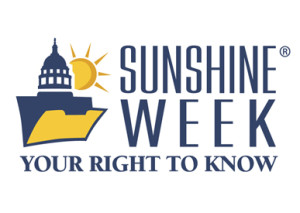Sunshine Week: A time for reflection and resolve

It is fitting that Sunshine Week originated in Florida, the Sunshine State.
But as in every time and in every state, Florida politicians would prefer that the sun didn’t shine so brightly, or much at all. Given their choice, most politicians would rather do the public’s business out of the blinding light of public view.
In 2002, a particularly mischievous year, Florida newspapers banded together to let their readers know their elected representatives were working to pass laws to do the public’s work in private.
The result was an amendment to the state constitution, approved by 77 percent of those voting, requiring that any such law have a two-thirds majority for passage.
Last week, a bill to strengthen open records laws in Florida passed in a Senate committee on the same day former Gov. Reubin Askew, the father of the state’s modern sunshine laws in the 1970s, died.
Advocates say the bill is a necessary bulwark against the never-ending press of lawmakers who wish to exempt themselves from public accountability.
Sunshine Week is now a national week of reflection, but the work never ends. In 2009, as newspapers and television stations increasingly withdrew from our nation’s statehouses, the Franklin Center recognized this crucial public service and dispatched its own reporters across the country.
Every day this week, Watchdog.org will run an essay from one of our reporters, who comprise our bulwark against government secrecy and irresponsibility. Theirs are vital stories to tell.
Investigations built on hard work and trust
By M.D. Kittle | Watchdog.org
MADISON, Wis. — Investigative reporters know that obtaining information in criminal investigations isn’t easy in the best of circumstances.
But the quest seems almost quixotic when the probe is shrouded in secrecy, bound by a court-ordered gag that silences the players by threatening violators with jail time.
Such is the case with Wisconsin’s politically charged John Doe investigation, a lengthy court-administered dragnet into conservative targets that is testing the boundaries of law enforcement and constitutional rights.
Wisconsin Reporter’s 34-part series, “Wisconsin’s Secret War,” into the alleged abuses surrounding the probe, didn’t begin with documents. It started with people, brave people who risked much to share their inside stories. As is vitally important in any investigative series, those relationships must be built on trust — and trust leads to documentation.
John Doe investigations act much like their grand jury counterparts, but the proceedings are overseen by a single judge, vested with enormous power and discretion — including the power to issue subpoenas and silence individuals involved.
Wisconsin Reporter first began hearing chatter about a possible probe into conservative groups in late September 2013. There was something big going down involving abuse of prosecutorial power, according to sources.
By late October, we had confirmed that several conservative 501(c)(4) groups were targets in the probe.
Because of the secrecy imposed in the investigations, no one in official circles would confirm the existence of a John Doe. Many of the suspected prosecutors involved wouldn’t even return phone calls.
Wisconsin Reporter received its breakthrough first by working the phones, reaching out to anybody who might know something, to anyone who might know somebody who might know something. There was a lot of fear.
At times it seemed almost impenetrable. One source would only meet at a fast-food restaurant 35 miles from his home. He would not talk on the phone.
Another source, a Republican official close to targets in the probe, told Wisconsin Reporter his friends had simply stopped talking.
“They’re tighter than a drum,” the source said.
It took some time to overcome that fear.
Wisconsin Reporter learned from several sources the probe had included pre-dawn raids on homes and offices; confiscated equipment and files; and demands for phone, email and other records.
In the interim, we filed open records requests — most that got us absolutely nowhere; some that offered a piece here or there to a broad jigsaw puzzle of secret prosecution.
We sorted through records, resumes, backgrounds and previous stories of the key players involved. We found documents and previous cases that pointed to professional conduct concerns and evidence of possible partisanship among the prosecutors. All the while we kept building our source base.
Eventually, some of those sources began to offer troubling details of events, and connected us to important documents vital to telling the full story of a John Doe investigation that many conservatives have billed as a political witch hunt.
And sometimes, as it happens in so many investigative reports, we just got lucky. In a recent court filing, we discovered that information that was supposed to be redacted wasn’t. Included in the 28-page legal brief were revelations about the John Doe judge’s reasoning for quashing the prosecutors’ subpoenas in the investigation, explanations that had been previously not been made public.
The story is far from over. Several legal battles now surround the investigation. Obtaining records will be an important part of our reporting moving forward. But when it comes to investigating the investigators in a process steeped in secrecy, cultivating good, reliable sources will continue to play the deciding role in shining sunlight on this important story.
Contact M.D. Kittle at mkittle@watchdog.org
The post Sunshine Week: A time for reflection and resolve appeared first on Watchdog.org.







